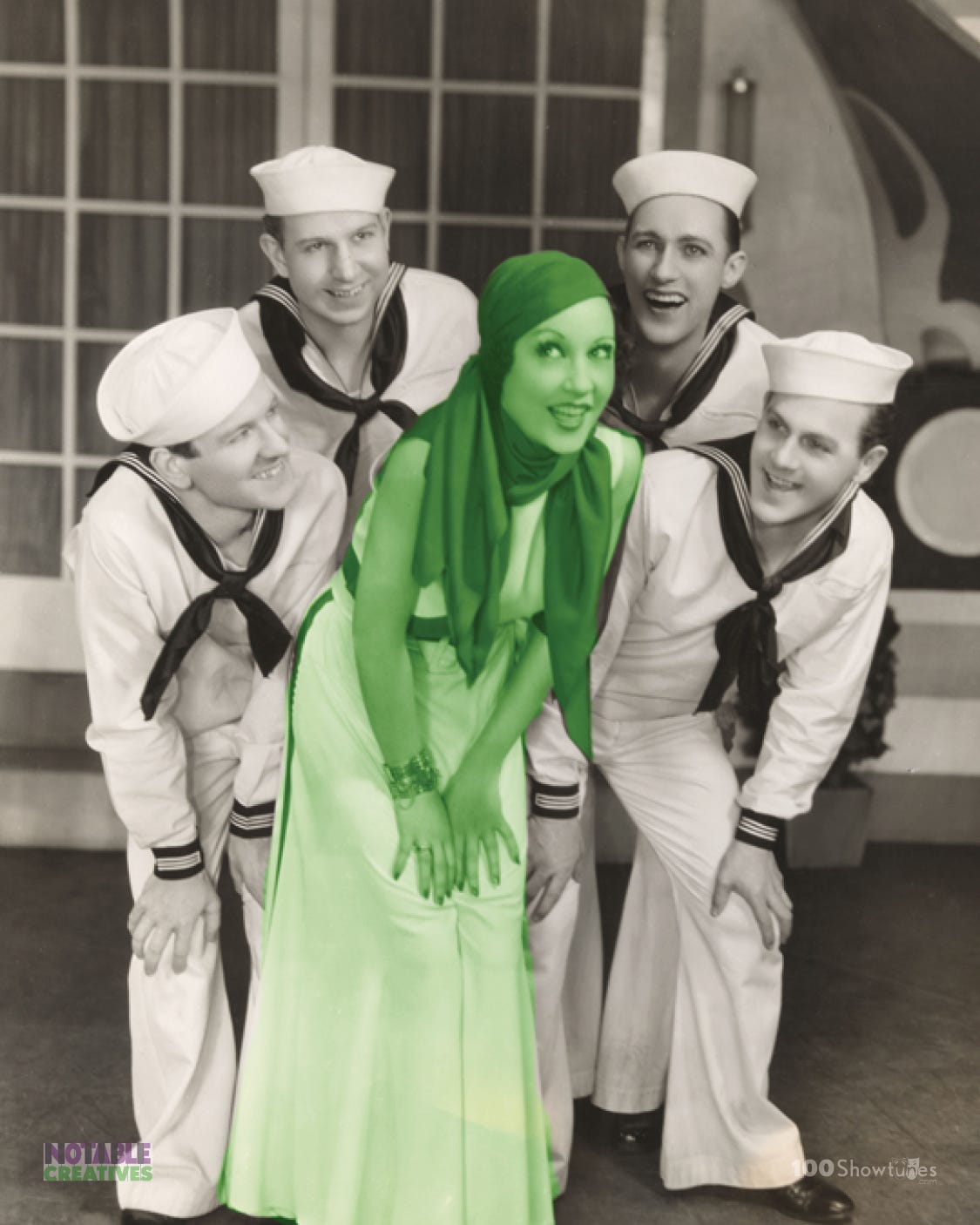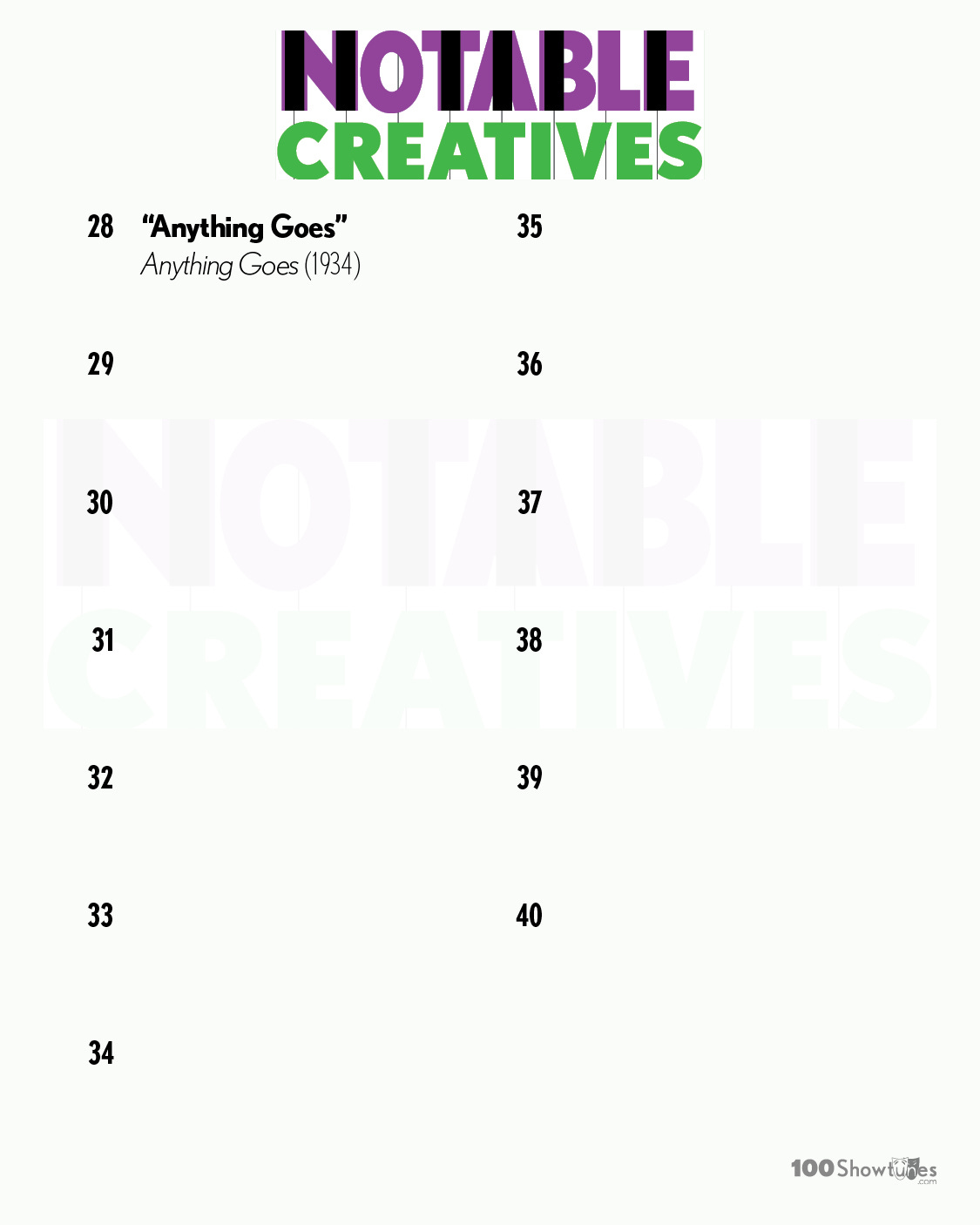No. 28. “Anything Goes”
ANYTHING GOES (1934). By Cole Porter (music and lyrics), Guy Bolton and P.G. Wodehouse (book), Howard Lindsay and Russel Crouse (book revision).
December, 1934. You’re at the latest Cole Porter musical, Anything Goes. Porter has been supplying Broadway (and Paris and London) with hit songs for nearly 20 years, including recent standards like “Night and Day” and “I Happen to Like New York.” While you’re a fan of Porter’s clever wordplay and witty, urbane lyrics, you’re just as excited to see the stars of this production—Ethel Merman and the comedy duo William Gaxton and Victor Moore. The show begins in London where you meet the main players: a young wall street broker (Billy Crocker, played by Gaxton); his friend Reno Sweeney (played by Merman), an evangelist turned night club singer in high-waisted pants; a young engenue who turns Billy’s head (Hope Harcourt) and her stuffy British fiancée (Evelyn Oakleigh); and gangster Moonface Martin (played by Moore), “Public Enemy 13.” They all converge on an ocean liner headed to America. Billy sneaks onto the ship where he and Hope fall in love. Reno and Evelyn fall in love. Moonface has any number of schemes brewing. At the end of Act 1, Billy is exposed as a stowaway and the various couplings reach a crisis point, at which point Reno takes in the surrounding absurdity and leads the company in a lot of tap dancing and the title song, “Anything Goes.”
Anything Goes is the rare pre-Oklahoma! musical that is regularly revived professionally and performed by student and community theaters (usually in one of its many revised forms). The plot is rather nonsensical, but the nautical setting, opportunities for tap dancing, and infectious Cole Porter score make for a memorable evening. Cole Porter is one of the fundamental songwriters of the early musical, along with the Gershwins, Rodgers, Hammerstein, Kern, and Berlin. His songs evoke a champagne and tuxedo elegance that mirrored Porter’s own lavish lifestyle (just as his topical, clever, and often shockingly vulgar lyrics reflected his hedonistic tendencies). Though married to a woman, he was a barely discreet and quite infamously active homosexual—he was America’s sassy gay best friend. Who else would or could write lines like:
If Mae West you like
Or me undressed you like
Why nobody will oppose?
When every night the set that’s smart is intruding in nudist parties in studios
Anything goes
Anything Goes also marks the birth of the Howard Lindsay/Russell Crouse partnership. The musical began rehearsals with Lindsay as director and a book written by Guy Bolton and P.G. Wodehouse with a plot that included a shipwreck and human trafficking. Then a real life ocean-liner wrecked, killing 138 people. But Bolton and Wodehouse were back in London at that point, leaving Lindsay to address the libretto issues, in addition to directing. He brought on Russel Crouse, and the pair collaborated for another 28 years on shows like the long-running charmer Life with Father(in which Lindsay also starred), the Pulitzer-prize wining political comedyState of the Unionand musicals with Porter, Irving Berlin, Harold Arlen, and Rodgers and Hammerstein.
Recommended Recording: ”Anything Goes,” Anything Goes (1987 Broadway Cast)
Despite a successful off-Broadway revival and several film adaptations, Anything Goes did not appear on Broadway for over 50 years following its original 1934 run. The Lincoln Center revival followed a trend of writing new books for old musicals that began with a “revisal” of No, No Nanettein 1973. Jerry Zaks’s direction, Michael Smuin’s dazzling choreography, and a new book by Timothy Crouse (Russell Crouse’s son) and John Weidman, created the sleeper hit of the season against such notable fare as Phantom of the Opera and Into the Woods. This version more or less became the standard edition most people perform today. Patti LuPone took on the role of Reno Sweeney, revealing comedic chops and a mastery of the American Songbook that surprised people who only knew her from Evita and Les Mis. I realize there is a certain irony of emphasizing Porter’s lyric writing and recommending a performance by Patti LuPone, who never met a consonant she liked1. But this song is a legitimate tongue twister with enough 1930s references to inspire a week’s worth of Wikipedia searches, so I would recommend reading them anyway.
Alternate Performances
Anything Goes has received ~16 cast recordings, including an heavily truncated 1935 Original London Cast, a Studio Cast featuring Mary Martin (who never passed up an opportunity to tackle a Merman role), and a 1988 complete recording of the original score constructed by John McGlinn.
1936 & 1956 Films - Anything Goes was adapted for film twice, though both versions alter the plot and score significantly from its original inception. Both feature Bing Crosby and supplement the Porter score with songs by entirely different composers. The 1936 version at least preserves a version of Merman’s performance as Reno, captured close to the time of the original production.
1962 Off -Broadway Cast - This recording is the first genuine cast recording of a major production of Anything Goes that features a score entirely by Cole Porter. It was the first production to bolster the score with familiar Cole Porter titles from other shows, and several of these interpolations (“Friendship,” “It’s De-Lovely,” and “Let’s Misbehave”) stayed with the show in the ‘87 revisal. Eileen Rodgers is a wonderful Reno, and it’s a charming recording. While most revivals follow the ‘87 revision, this edition of the show is available for licensing. (No author is credited with the revisions to the libretto.)
2011 Broadway / 2021 London Revival - The 2011 Broadway Anything Goes worked from the 1987 script and added a few tweaks. Kathleen Marshall directed and choreographed, and Sutton Foster had a tremendous personal triumph playing somewhat against type as the urbane Reno. 10 years later she reprised her performance in a 2021 London remounting of the Broadway production. A proshot preserves this production, making it the only screen version of Anything Goesthat actually features the story and score of the musical .
Is it Covered by The Rat Pack, Audra McDonald, or Glee?
The Rat Pack - Frank Sinatra starred in a heavily abridged 1954 television adaptation of Anything Goes as an episode of The Colgate Comedy Hour. He played the equivalent of the Billy Corcoran character, but was named Harry Dane for some reason. Merman and Sinatra are not a match made in heaven and probably shouldn’t have even been made in 1950s television.
Glee season 3 episode 1 (“Purple Piano Project”) features a mash-up of “Anything Goes” and “Anything You Can Do” from Annie Get Your Gun. A pair of aspiring attendees of NYADA—who happen to be doppelgängers of Kurt and Rachel—perform the mash-up at a NYADA interest meeting, prompting Kurt and Rachel to burst into tears at the realization that they will face more competition for their dreams than they realized.
In the Wings
And we’re off! Song No. 29 will drop next week. Until then, there are basically limitless Cole Porter recordings to pass the time. My personal favorite is this version of Carolee Carmello singing “Night and Day” from a 1997 concert.
…until she said “Audra McDonald is not a friend” with, as the interviewer noted, a “hard ‘D.’”




